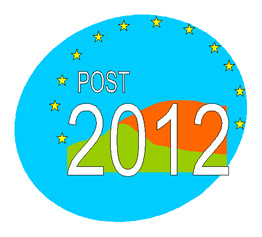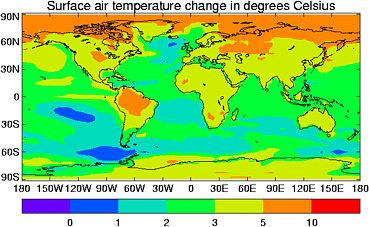
Action on Climate Change post 2012
The EU's Contribution to Shaping the Future Global Climate Change Regime
The Kyoto Protocol to the United Nations Framework Convention on Climate Change (UNFCCC) is only a first step to address the serious global threat of climate change. Numerous reports, including the Intergovernmental Panel on Climate Change's Second and Third Assessment Reports, call for significant cuts in global emissions to well below 1990 levels, and to below the cuts that the Kyoto Protocol defines. Only significant cuts will allow atmospheric greenhouse gas concentrations to stabilise at a level that would "prevent dangerous anthropogenic interference with the climate system", as required by Article 2 of the UNFCCC.
|
The Kyoto Protocol requires the international community to initiate discussion on the global response to climate change after the end of the Protocol's 'first commitment period' (2008 to 2012) by the end of 2005.
- In anticipation of the international debate on the future of the global climate change regime, the European Council, at its meeting on 25 and 26 March 2004, announced that it will consider "medium and longer term emission reduction strategies, including targets" at its meeting in spring 2005.
The European Council's discussion comes in recognition of a growing awareness of the threat that climate change poses to our planet and the need to find responses that are environmentally effective while preserving and enhancing Europe's competitiveness.
- The European Council's discussion also seeks to create a stable and predictable policy environment concerning the EU's response to climate change, providing all sectors of the European economy with clear indications of how EU policy in this area is likely to evolve.
- The conclusions resulting from the spring meeting will provide an important input into the international discussions on global climate change policy after the end of the Kyoto Protocol's first commitment period (2008-2012).
The Commission's Communication on action on climate change post 2012![]()
In preparation for its consideration of medium and longer term emission reduction strategies, including targets, the European Council requested that the Commission prepare an analysis of benefits and costs of action against climate change, which takes account both of environmental and competitiveness considerations.
In response, the Commission on 9 February 2005 adopted the Communication on "Winning the Battle Against Climate Change" and a more detailed Staff Working Paper. The Communication outlines key elements for the EU's post-2012 strategy. It highlights the need for broader participation by countries and sectors not already subject to emissions reductions, the development of low-carbon technologies, the continued and expanded use of market mechanisms, and the need to adapt to the inevitable impacts of climate change.
- Communication (pdf ~80K)



















- Staff Working Paper (pdf ~838K)
- Press release
- Questions and Answers (pdf ~388K)
 ACCP 2012: The EU’s stakeholder consultation on Action on Climate Change Post 2012
ACCP 2012: The EU’s stakeholder consultation on Action on Climate Change Post 2012
In preparation of the February 2005 Communication, on 13 September 2004 the Commission launched a consultation to provide an opportunity for stakeholders to submit their views on how the future global climate change regime should be shaped and what the EU's contribution to this should be.
This stakeholder consultation took place through two routes:
- The first was a stakeholder conference,held on 22nd November 2004;
- The second was the publicly accessible web-based forum "Future Action on Climate Change". The submissions and summaries of these submissions, by sector, are available on the website.
The results of these consultations were used by the Commission in identifying important issues for consideration in preparing its Communication for the spring 2005 European Council.
Further information:
- To guide and stimulate stakeholder participation in the web-based forum, the Commission drafted a background paper on "Future Action on Climate Change: A Stakeholder Consultation on the EU’s Contribution to Shaping the Future Global Climate Change Regime". The paper aimed to stimulate discussion but does not necessarily represent the Commission’s views.
- A full overview of the range of other activities, conferences and recent papers related to future actions on climate change post-2012 can be found at the website of the " future international action on climate change network".
- More information on the EU's climate change policy can be found at the the Commission's Climate Change homepage
- Policymakers Summary (pdf ~95K),
- Technical report (pdf ~1,4M),
- Slides (pdf ~95K)
| last update: 06/04/2005 |
| |

